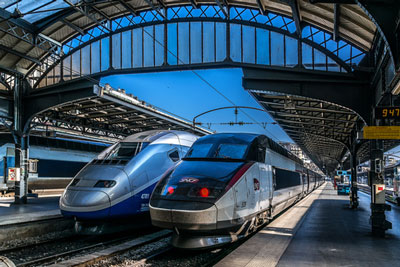General approach adopted on Market Pillar of the Fourth Railway Package
Posted: 8 October 2015 | | No comments yet
Transport Ministers of the European Transport Council have adopted a general approach on the Market Pillar of the Fourth Railway Package. The general approach will include proposals to liberalise domestic rail passenger services and strengthen the governance of railway infrastructure. The agreement represents a compromise between those countries who wished to see far more ambitious […]


Transport Ministers of the European Transport Council have adopted a general approach on the Market Pillar of the Fourth Railway Package.


The general approach will include proposals to liberalise domestic rail passenger services and strengthen the governance of railway infrastructure. The agreement represents a compromise between those countries who wished to see far more ambitious open markets, and those who wished to retain national state-owned structures.
François Bausch, Luxembourg’s Minister for Sustainable Development and Infrastructure and President of the Council, said: “Today we reached an agreement on EU regulation which will help promote rail throughout Europe. I am satisfied with the large support but even more pleased at the balanced and solid solutions that we managed to agree upon.”
Under the new proposals, EU train companies would have non-discriminatory access to the network in all EU countries for the purpose of running domestic passenger services. According to the council, they could either set up their own commercial services to compete with other operators, or bid for public service contracts. Safeguards would be put in place to prevent conflicts of interest and increase the transparency of financial flows between infrastructure managers and rail operators.
“Today we reached an agreement on EU regulation which will help promote rail throughout Europe”
The Council also reached an agreement on the Public Service Obligation (PSO) Regulation. The Council agreed that competitive tendering should be the main rule for awarding public service contracts. However, a number of exceptions to this rule would allow public service contracts to be awarded directly. They address concerns such as the suitability of competitive tendering for small markets and the need to ensure the long-term continuity of public rail transport services.
In particular, member states’ authorities would be able to opt for direct award if justified by the structure and geographical characteristics of the market and network and if it would improve the quality of services and/or cost-efficiency. The national authorities would assess progress in improving the services using performance criteria, such as the punctuality and frequency of trains.
Commenting on the latest Forth Railway Package agreement, The Community of European railway and infrastructure companies (CER) believes it is ‘time to proceed swiftly with the trilogue negotiations with the European Parliament, and to let the Technical Pillar enter into force as soon as possible.’
CER Executive Director Libor Lochman said: “I wish to congratulate the Luxembourg Presidency for the constructive work done with the delegations of all its fellow Member States. CER sees that, generally speaking, good texts have been found, and that these texts constitute a sound basis for the negotiations with the Parliament, which we expect to start very soon. But I also take this opportunity to ask both Council and Parliament to now proceed with the publication of the Technical Pillar: the rail sector urgently needs harmonised authorisation and certification procedures to achieve dramatic cost reductions, it cannot wait any longer!”
Responding to the agreement by Transport Minsiters of EU Member States to the 4th Railway Package, a spokesman for the Rail Delivery Group, which represents Network Rail and train operators, said: “We support opportunities for Europe to move towards a more liberalised railway where the sector can grow its market share, deliver even greater value and improve services for passenger and freight customers. The liberalisation of the UK’s railway has been a major success, with increases in rail freight and passenger journeys delivering benefits for businesses and taxpayers.
“For these reasons we have been a strong supporter of the principles behind the 4th Railway Package, which seeks to further liberalise the European rail market. We would have liked Member States to agree a greater degree of liberalisation, however we fully support this compromise as a useful step forward, and will continue to engage constructively in this process.”
The recent council decision allows the presidency to start negotiations with the European Parliament. Both institutions need to approve the proposals before they can become law.
Related topics
Related organisations
Community of European Railway and Infrastructure Companies (CER), European Parliament



